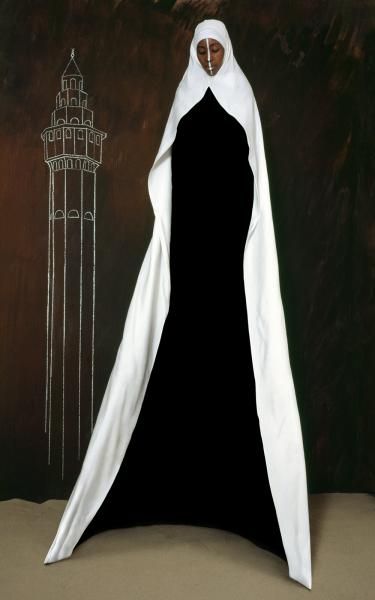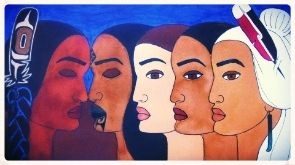Joumana Haddad es poetisa, escritora y traductora. Esta activista feminista por los derechos de las mujeres, la secularización de la sociedad y la defensa de la libertad sexual, es muy controvertida en su país, Líbano, por razones obvias. En el artículo que reproducimos a continuación expone sus puntos de vista sobre la utilización de un lenguaje marcadamente sexista que alude, constantemente, a ciertos atributos masculinos y a comportamientos definidos como varoniles para calificar determinadas acciones protagonizadas por mujeres y así "elevarlas" a la categoría de masculinas, si con ello se pretende valorarlas positivamente, o para descalificarlas, si lo que se busca es cuestionarlas y/o depreciarlas por no responder al estereotipo que se ha construido de femeninidad.
La autora denuncia la aceptación social de la masculinidad como arquetipo y la necesidad de construir la feminidad al margen de un determinado modelo de lo masculino que, en mi opinión, no sabe construirse sin devaluar lo femenino.
La administradora del blog
A penis? Thanks, but no thanks!
“Why do people say “grow some balls”? Balls are weak and sensitive. If you wanna be tough, grow a vagina. Those things can take a pounding” – Betty White
“You got some balls, woman!” An expression that I have heard often – too often – in my life, and which has been addressed to me every time I did something defined as “courageous,” or said something considered “bold.”
“You think like a man,” a male colleague once declared to convey to me his admiration.
“You are such a dude,” a lover once told me in a complete state of shock because I wanted him to leave the room right after sex.
Even my girlfriends confirm “You have a guy’s brain and behavior” every time we discuss relationships and the way I envision them.
In most cases, these statements were meant as a compliment. But I never took them that way. I resented them each and every time.
Why? Because they were expected to be flattering. Because telling a woman she behaves like a man (whatever that means) is supposed to be the ultimate praise. Because underlying the apparent esteem and appreciation is the sexist conviction that men are the gutsy ones, the initiative-takers, the challengers, the tough and powerful and audacious and independent, and that if a woman displayed any of the latter characteristics it meant she had gained the “privilege” of being evaluated as a man and described with the vocabulary of manhood. Even women – at least many of them – indulge in these definitions and see themselves as being soft, over sentimental and prone to attachment. In short: weaker.
*
Allow me to be more explicit: I definitely am what you would call a strong woman, but I don’t have any penis envy. And as much as I owe to feminism, one of the things I could never handle or accept about some old-guard feminists (which is the reason I belong to third-wave feminism) is a certain rejection of femininity, considering it a sign of weakness, whereas I feel completely powerful in my identity and its characteristics without the need to adopt “masculine” standards and clichés in order to prove that I am strong (that’s a patriarchal trap as well, and a surrender to plain superficial dualities).
Is there anything more magnificent than a woman insisting on winning her battles while remaining a woman? Personally, I don’t think there is.
In fact, the worst thing that can happen to a woman in the midst of her struggle for her rights, in order to gain respect and to prove her ability to undertake any job and find a place for herself in society – particularly in third-world societies – is for her to forget that she is a woman, to lose the woman inside her.
I say this because some Arab (and non-Arab) women believe that the battle for equality demands giving up their femininity. But I don’t need to behave like a man to be a strong woman (and who decided what behaving “like a man” should mean, anyway?). I don’t need to be against men to be pro-women.
Furthermore, isn’t the de-feminization of women an act of surrender par excellence to men’s blackmail and their shallow view of the female entity as a sum of thighs, tits, asses, lips, and so on and so forth?
*
I recently read about an experimental preschool in Sweden called Egalia that practices “gender neutral” education. For example, its staff avoids using words like him or her, and addresses the kids as “friends” rather than girls and boys. Now, as much as I am against gender stereotypes and societal standards that expect girls to be girlie and nice and boys to be manly and rough, I can only be skeptical about such an education’s ability to engineer real equality between the sexes. The aim of the school is noble, but the means are not convincing. Our gender is an intrinsic part of our identity: Is it not confusing for a young child to blur gender boundaries? Equality should be about everyone being treated fairly and equally, not about forcing everyone to be the same. Equality should be about embracing diversity and respecting each person’s differences, not about ignoring them. I resent being told that the only way I can be “equal” is by denying my gender. Denying someone their gender is inherently sexist, and the words “male” and “female” imply a difference, but not that one is less than the other.
Yet you might ask: What does it mean for a woman to be a woman? It does not mean, of course, the banality of wearing skirts, putting on makeup and growing long hair. It means for her to be, and to want to be, herself, and not anyone else’s self. And especially not the man’s self. Being herself fearlessly, without panic or wariness or taboo or shame or any other internal or social obstacles, whether visible or not. It means that she sustains all this without worrying whether a man will approve of her and her success, or judge her failure. It means that she takes, instead of waiting to be given. For a woman is her own sole expert, and her own guide to herself. She is the only reference on her body and her spirit and her essence. She must refuse to be evaluated – and to evaluate herself – by being compared to men, thus making manhood the absolute reference. In my modest view of the world, both human identities go together, hand in hand, accomplices and equal, challenging, motivating and supporting each other, yet staying amazingly different.
*
I believe in a woman’s right to be for strong, intelligent and independent femininity, yet against aggressive slogans.
I believe in a woman’s right to have non-belligerent relations with men, without these relations being interpreted as submissive.
I believe in a woman’s right to be a man’s equal without being tempted by a discourse of hegemony over him, nor one of similarity with him.
I believe in a woman’s right to enjoy a bouquet of roses even if she drives tractors and changes engine oil.
Also, and especially, I believe in a woman’s right not to blindly follow the crowd and to believe in her choices, in her small battles, in the importance of cultivating her own private garden.
Ladies, it is time for us to celebrate the strength and particularities of our womanhood. A womanhood unafraid of its truth. Unafraid of its power. Unafraid of its greed. Unafraid of its fierceness. Unafraid of its curiosity. Unafraid of its honesty. Unafraid of its madness. Unafraid of its talents. Unafraid of its beauty. Unafraid of its language. Unafraid of its extremes. A womanhood, in short, unafraid of its femininity.
*
As for you, gentlemen, trust me: I do not have penis envy. And I surely don’t want – nor need – a pair of balls. I am perfectly happy – and proud – to have a vagina.
However, I admit that a tiny part of me is looking forward to the day when we would be complimenting men if we say to them: “What a vagina you have there, dude!”
… For the day when such a statement would stop being an insult is the day when we would really start being equal.
Artículo publicado en su blog J.SPOT




0 comentarios :
Publicar un comentario